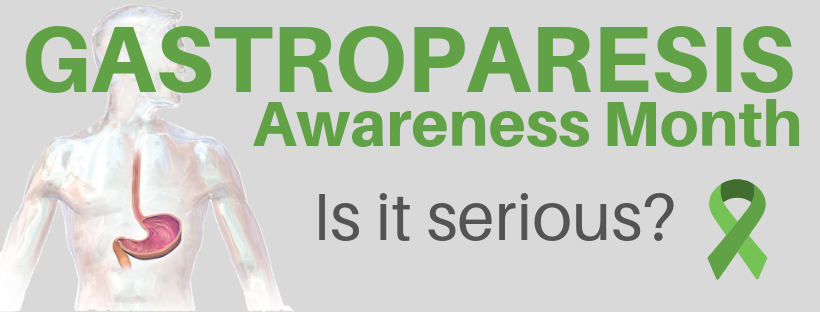Gastroparesis: Symptoms, Causes, and Treatment
What is Gastroparesis?
You can break down the word into two components:
- Gastro/Gastric meaning stomach
- Paresis meaning paralysis
This translates to paralysis of the stomach.
Gastroparesis is a condition in which the stomach empties abnormally slow. The function of the stomach is to churn and grind your meal and then, contract to squeeze food through to the small intestine. For people who have gastroparesis, this function does not occur properly.
What Kind of Symptoms Can Occur with Gastroparesis?
The symptoms can vary and they are non-specific, but may include nausea, bloating, early satiety (feeling full early into the meal), belching, or heartburn. Sometimes it may even include vomiting undigested food several hours after eating.
What Causes Gastroparesis?
There can be many different causes of delayed stomach emptying, but the most common is diabetes. Another common cause includes the use of narcotic (opioid) medications since these can slow down the entire digestive system. Other less common causes include infections, autoimmune and endocrine disorders, and trauma to the Vagus nerve during surgery of the esophagus, stomach, or duodenum.
How Is Gastroparesis Diagnosed?
A diagnosis may be made based on several different tests.
- The condition can be diagnosed during an upper endoscopy when there are findings of retained food within the stomach, but this could also be seen in a patient who has been sneaky and ate before their procedure!
- A test called Gastric Emptying Scan may be ordered to see how well your stomach empties. This test is performed by a radiologist. Usually, they will have you eat a scrambled egg (or something similar) that has been injected with a small amount of radioactive material. This material can be traced with images to see how much is left in your stomach after 1 hour, 2 hours, 3 and 4 hours.
- Sometimes an upper GI series with small bowel follow-through can be ordered. This will assess any signs of delay downstream in the small intestine that could be causing back up into the stomach.
How Is Gastroparesis Treated?
If the cause of gastroparesis is due to medication (such as narcotics) then treatment would include stopping the medication (if possible). There is no cure for gastroparesis, but the symptoms can be managed with dietary changes. This usually includes avoiding fatty foods since they take longer to digest and avoiding high fiber foods like raw veggies which are harder to digest. Your gastroenterologist may have a handout with specific details regarding diet choices. There are a few medications approved for gastroparesis but are less frequently used due to limited effectiveness and potential side effects.
Article by Justine Unruh, PA-C.
Formerly a physician assistant at Digestive Health Specialists.
—
Digestive Health Specialists, PA is here to help if you, or someone you know, would like more information, or if you are experiencing any of the above symptoms and would like further evaluation. To make an appointment, feel free to give us a call at 336-768-6211.






